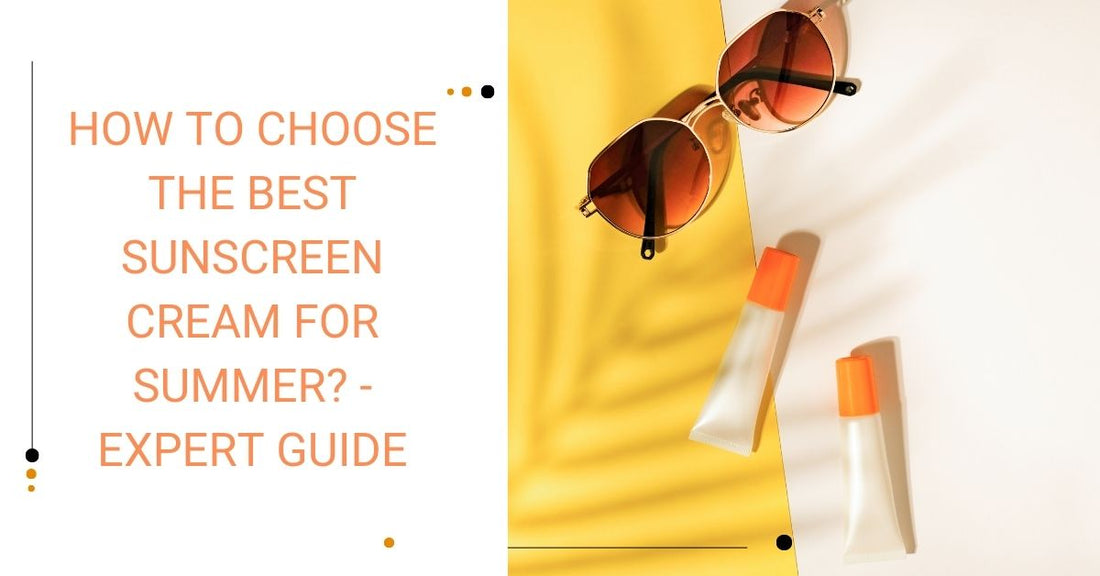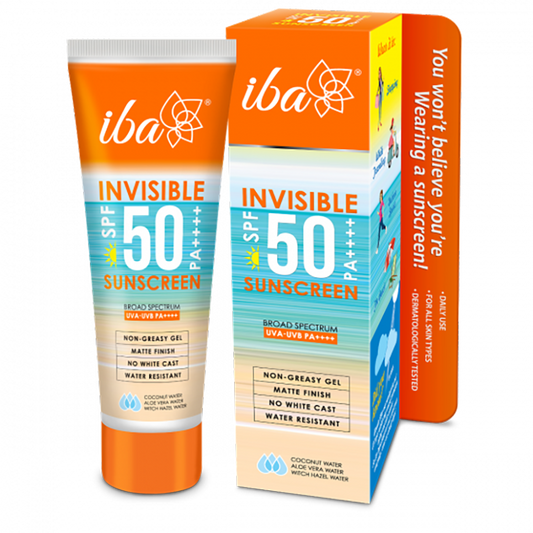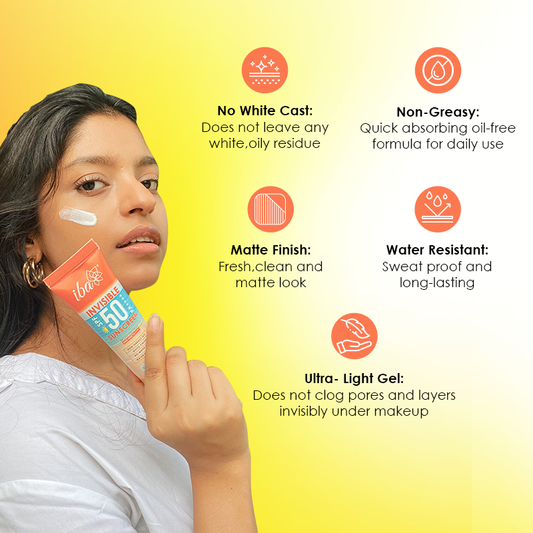With the summer sun shining bright, it's essential to shield your skin from harmful UV rays. Sunscreen is a must-have product in your skincare routine, but with so many options available, how do you choose the best one? In this expert guide, we'll walk you through everything you need to know about selecting the perfect sunscreen for your needs.
How to Choose Best Sunscreen?
Know Your Skin Type: The first step in choosing the right sunscreen is understanding your skin type. If you have oily skin, look for oil-free or gel-based formulas that won't clog pores. For dry skin, opt for moisturising sunscreens with added hydrating ingredients like hyaluronic acid.
Check the SPF: SPF (Sun Protection Factor) indicates how well a sunscreen protects against UVB rays, which cause sunburn. The American Academy of Dermatology recommends using a broad-spectrum sunscreen with SPF 30 or higher for adequate protection. Consider a higher SPF if you'll be spending extended periods in the sun.
Consider Your Activities: Think about your planned activities when choosing sunscreen. If you'll be swimming or sweating, opt for a water-resistant formula to ensure long-lasting protection. Look for sunscreens labelled "sweat-resistant" or "sport" for added durability during outdoor activities.
Look for Broad-Spectrum Protection: UV rays can damage the skin and lead to premature ageing and skin cancer. Choose a sunscreen that offers broad-spectrum protection, which shields against both UVA and UVB rays. Ingredients like zinc oxide and titanium dioxide provide effective broad-spectrum coverage.
How to Choose Sunscreen SPF?
When it comes to SPF, higher isn't always better. Here's how to choose the right SPF for your needs:
SPF 15-30: Perfect for everyday use and minimal sun exposure. This range provides adequate protection for daily activities like running errands or commuting to work.
SPF 30-50: Ideal for moderate sun exposure during outdoor activities such as hiking, gardening, or spending time at the park. This SPF range offers enhanced protection against prolonged sun exposure without feeling too heavy on the skin.
SPF 50+: Recommended for individuals with fair or sensitive skin or those planning prolonged outdoor activities. This high SPF provides maximum protection against harmful UV rays and is especially beneficial for those prone to sunburn or skin sensitivity. Choose the best Sunscreen SPF 50 at Iba Cosmetics!
Remember to reapply sunscreen lotion every two hours, especially if you're sweating or swimming.
How to Choose Best Sunscreen for Summer?
Choosing the best sunscreen for summer doesn't have to be complicated. By considering your skin type, SPF needs, and planned activities, you can find the best SPF for summer to keep your skin protected and healthy all season. Remember to reapply regularly and enjoy the sunshine safely!
Why Should You Wear Sunscreen Daily?
Wearing sunscreen daily is crucial for maintaining healthy skin and protecting against sun damage. Here are five reasons why it's essential to incorporate sunscreen into your daily skincare routine:
UV Protection: Sunscreen shields your skin from harmful ultraviolet (UV) rays emitted by the sun. UV radiation can cause various skin issues, including sunburn, premature ageing, and an increased risk of skin cancer. By wearing sunscreen daily, you reduce your exposure to these damaging rays and lower your risk of developing skin problems.
Prevents Premature Ageing: Sun exposure is one of the leading causes of premature ageing, including wrinkles, fine lines, and age spots. UV rays break down collagen and elastin fibres in the skin, leading to loss of elasticity and firmness. Regular use of sunscreen helps prevent photoaging and keeps your skin looking youthful and radiant.
Reduces Skin Cancer Risk: Prolonged sun exposure without protection can increase your risk of developing skin cancer, including melanoma, the deadliest form of skin cancer. Sunscreen acts as a barrier, preventing UV rays from penetrating the skin and damaging DNA, which can lead to the development of cancerous cells.
Maintains Even Skin Tone: Sun exposure can cause hyperpigmentation, uneven skin tone, and dark spots, especially in areas frequently exposed to the sun, such as the face, hands, and arms. By wearing sunscreen daily, you help maintain a more uniform complexion and prevent the appearance of dark spots and discoloration.
Supports Overall Skin Health: Sunscreen not only protects your skin from sun damage but also helps maintain its overall health and integrity. By creating a barrier between your skin and harmful UV rays, sunscreen allows your skin to retain moisture, reduce inflammation, and function optimally, promoting long-term skin health.
FAQ’s
Is sunscreen necessary for oily skin in summer?
Yes, sunscreen is necessary for oily skin in summer. Opt for oil-free or gel-based formulas to avoid exacerbating oiliness. Sunscreen helps protect the skin from harmful UV rays, preventing sun damage and premature ageing. Look for non-comedogenic options to prevent clogged pores. Choose sunscreen for oily skin at Iba Cosmetics.
What's the best sunscreen for hot weather?
The best sunscreen for hot weather is one that is water-resistant or sweat-resistant, ensuring long-lasting protection even in high temperatures and humidity. Look for formulas specifically designed for outdoor activities. Additionally, consider a broad-spectrum sunscreen with SPF 30 or higher to shield your skin from both UVA and UVB rays.
Can I use a moisturizer with sunscreen?
Yes, you can use moisturizer with sunscreen, but make sure to apply the sunscreen as the final step in your skincare routine for optimal protection. Explore a vast range of affordable skin brightening day creams at Iba Cosmetics.
Should I wear sunscreen indoors?
Yes, wearing sunscreen indoors is still important. While glass windows can block UVB rays, they don't necessarily provide full protection against UVA rays, which can penetrate glass and contribute to skin ageing and damage. Additionally, exposure to blue light from electronic devices indoors can also affect the skin. Incorporating sunscreen into your daily skincare routine, even when indoors, helps to provide an extra layer of defence against these potential sources of skin damage, keeping your skin healthy and protected in the long run.
Can I use expired sunscreen?
It's not recommended to use expired sunscreen, as it may have decreased effectiveness in protecting your skin from harmful UV rays. Over time, the active ingredients in sunscreen can degrade, reducing their ability to provide adequate protection. Using expired sunscreen could increase your risk of sunburn, premature ageing, and skin cancer. It's important to check the expiration date on your sunscreen and replace it with a fresh bottle when it expires to ensure you're adequately protected when spending time outdoors.



